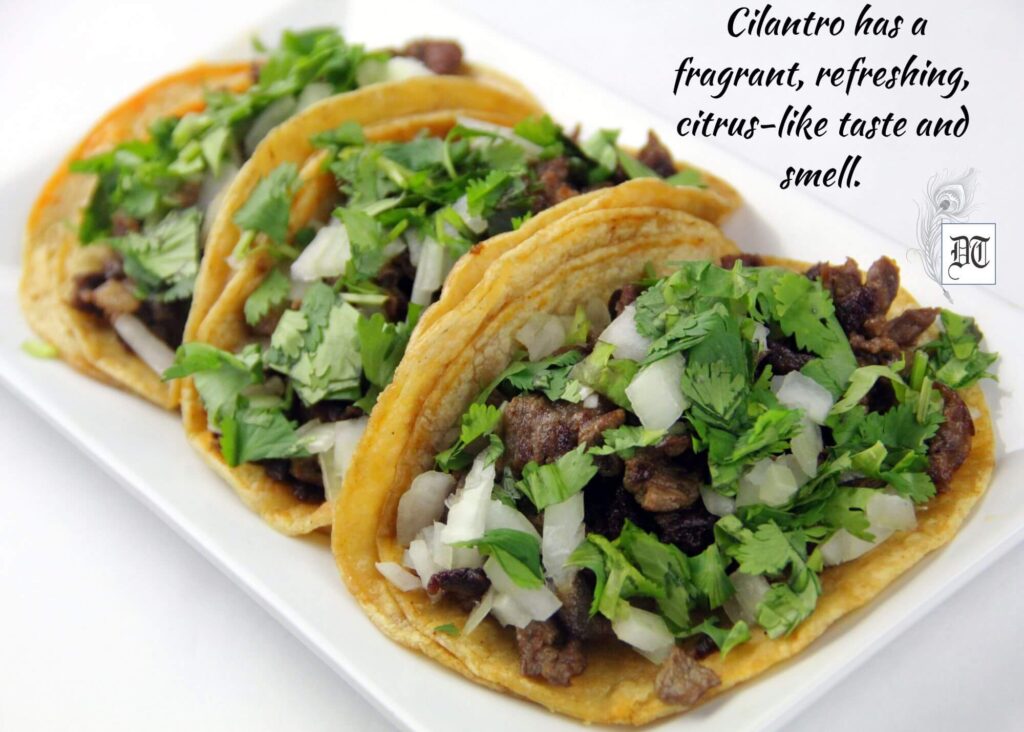Reading Time: 3 minutes
Three similar herbs, Coriander leaves, Cilantro, and Parsley, have specific differences too. Ruchira tells us how these invaluable herbs are used in kitchens worldwide – an exclusive for Different Truths.

During any part of the year, this tender, delicate herb comes in handy for people directly or indirectly connected with gastronomy and culinary arts. If allowed to flower, this herb with bright green curly or flat leaves produces beautiful, tiny yellow and green flowers during the year’s warmest months.
I am talking about coriander leaves, familiar as hara dhania, dhania-patta, kothimeera (Telugu), kottambari soppu (Kannada), and such, on the subcontinent.
… trendy people prefer to call Coriander leaves by more exotic names, such as Cilantro or Parsley.
Of late, trendy people prefer to call Coriander leaves by more exotic names, such as Cilantro or Parsley. Though similar, these have specific differences. This extraordinary yet ubiquitous herb, now subjected to worldwide cultivation, application, and popularity, may originally be traced back to the Mediterranean region comprising southern Europe and western Asia.
Etymologically the name “parsley” is derived from the Greek word Petroselinum, meaning rock celery, since this plant thrives on rocks and walls.
According to mythology, Parsley was believed to have first sprouted in the blood of the slain Greek hero Arche Morus. Greeks considered Parsley as both sacred and evil. Greek warriors fed parsley leaves to their horses to give them strength.
Surprisingly clusters of these leaves were laid on the tombs of the dead besides crowning victorious heroes and champions. Historians credit Charlemagne, the Holy Roman Emperor, for popularising Parsley because he had allowed it to grow profusely throughout his dominions.
Parsley was known to be abundantly used during the Hebrew festival of Passover.
Parsley was known to be abundantly used during the Hebrew festival of Passover. Likewise, Parsley appears at almost every Thanksgiving feast in North America.

Cilantro — so widespread in the US and Mexico — is the Spanish name for coriander leaves. The colonials have long departed, but the name has stuck on. The original variety had flat leaves, but the curly-leafed type was found later and became hugely popular. Though used interchangeably in common parlance, Coriander and Cilantro have subtle differences. Cilantro has a fragrant, refreshing, citrus-like taste and smell, while coriander has a warmer, spicy, nutty taste and odour.
Parsley leaves are believed to possess anti-inflammatory properties. They have reportedly been used to curb menstrual cramps. In addition, they are also known to induce abortions. It is a panacea for ailments like digestive disorders, bronchitis, and toothaches.
Coming to the brass tacks, Coriander leaves play a crucial role in Indian gastronomy…
Coming to the brass tacks, Coriander leaves play a crucial role in Indian gastronomy, regional differences notwithstanding. It may take jolly well term a passe-partout because it can jell with a vast range of vegetables, fish, and meats. On a personal note, I am simply in love with the smell emanating from the sprigs of fresh hara dhania.
I also find the soothing green hue pleasing. Be it an omelette, a scrumptious aloo paratha, or the nondescript chilla, a dash of dhania-patta lights up my day each morning. Lunchtime dishes— be fresh salads, lentils/ dals, roasted aubergine /eggplant bharta, permutations, or combinations of potato-peas-tomato cauliflower curries — the taste is greatly enhanced with a garnishing of parsley.
Evening snacks, e.g., bhel puri, Sev puri, jhaal muri and so forth, would be dull and insipid without this herb.
Parsley is a staple plant for your kitchen garden. It requires near-zero maintenance and flourishes well in pots. So could you grab one today?
Picture design by Anumita Roy















